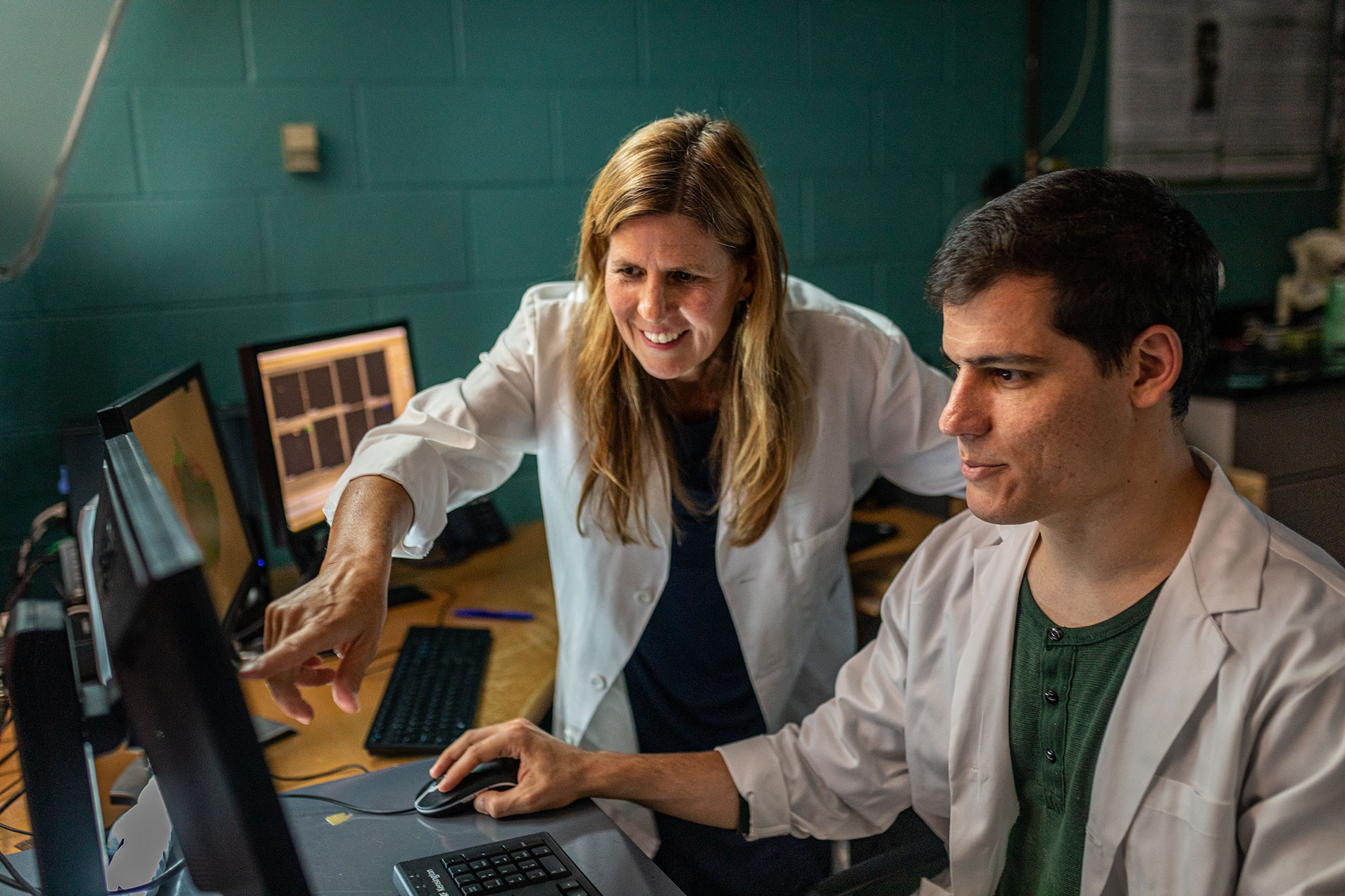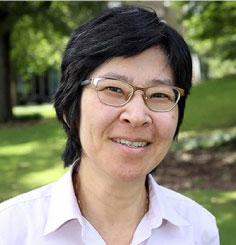
Welcome to Mechanical Engineering
Mechanical Engineering is among the oldest academic departments at Michigan State University and maintains a legacy of innovation through the fundamental principles of mechanics, thermosciences, and design. Pioneering studies offer a wide range of interests in aerospace, automotive and manufacturing, robotics, medical devices and artificial organs, and renewable energy.
Professors conduct leading-edge research with funding from prestigious organizations, including the National Science Foundation, National Institutes of Health, the U.S. departments of Energy and Defense, and prominent industries. It creates opportunities for undergraduates to help professors with techniques and technologies that are often a first in their area of expertise. The department also has an outstanding external advisory board that inspires MSU to stay at the forefront of education.
1,510
Undergraduate Students
(Fall 2024)
143
Graduate Students
(Fall 2024)
310
Degrees Granted
(2023-2024)
$7.5M
Research Expenditure
(Fall 2023)
41
Tenure Faculty
(Fall 2023)
 Welcome to the Department of Mechanical Engineering at Michigan State! We have about 41 tenure system faculty and 10 fixed-term faculty and teaching specialists who teach more than 1,400 undergraduate and more than 150 graduate students the fundamentals of, and emerging topics in, the broadest of the engineering disciplines. Our online Master of Science program enables professionals to pursue an advanced degree while working full-time.
Welcome to the Department of Mechanical Engineering at Michigan State! We have about 41 tenure system faculty and 10 fixed-term faculty and teaching specialists who teach more than 1,400 undergraduate and more than 150 graduate students the fundamentals of, and emerging topics in, the broadest of the engineering disciplines. Our online Master of Science program enables professionals to pursue an advanced degree while working full-time.
The Department is distinguished by its supportive, inclusive and collegial culture. Mechanical Engineering students and faculty in the:
- Biomechanics
- Dynamic Systems and Controls
- Fluid-Thermal Science and Engineering
- Solid Mechanics, Design and Manufacturing
research groups work with colleagues across the College of Engineering and the 16 other Colleges at MSU (including Agriculture and Natural Resources, Education, Human Medicine, Natural Science, and Veterinary Medicine), as well as the new Facility for Rare Isotope Beams. Research expenditures in the College of Engineering, which exceed $60 million per year, have grown steadily post-pandemic. Major sponsors of the Department’s research include Federal agencies such as National Science Foundation, National Institutes of Health, Department of Energy, Department of Defense, and Department of Agriculture, as well as companies including Alliance Corporation, Booz Allen Hamilton, FEDCO, Ford, General Motors, Hyundai, and Magna International.
Please explore our website to learn more about our people, research, curriculum, Design Day, and the many ways mechanical engineers change the world.
Go green!
Minami Yoda
Professor and Chairperson
The Department of Mechanical Engineering offers a curriculum that combines a foundation in mathematics and science and a core of engineering science and mechanics-based courses with the creative processes of engineering design, and supports student groups engaged in design-intensive and entrepreneurial extracurricular activities. The Mechanical Engineering Program is accredited by the Engineering Accreditation Commission of ABET. The program integrates individual mastery of core subjects in fluid mechanics, thermal engineering, mechanical systems, and solid mechanics with teamwork-based solutions to open-ended design problems, real-world experiences and experimental techniques. Students learn the skills to develop ideas from concept to product.
A distinguishing component of the undergraduate experience in mechanical engineering at MSU is provided by the design program, a pillar of the undergraduate curriculum that combines core instruction in design with hands-on experiences in design-build-test projects. A sequence of four design-intensive courses culminates in a capstone course, underpinned by industrially sponsored projects. Industrial sponsorship for the capstone design experience is strong. Over the last 10 years, 130 companies, most from within the state, have sponsored 369 capstone design projects. In addition to industrially motivated projects, students have the option to participate in humanitarian projects.
The Department has a long-established education abroad program in Germany (RWTH Aachen University) and education abroad programs in France (École Catholique d'Arts et Métiers) and the United Kingdom (University of Edinburgh).
Within three to five years of graduation, our graduates are expected to:
- Have evolved into competent, ethical and responsible engineers practicing in a diverse range of current and emerging activities.
- Use their mechanical engineering education as a foundation for personal and professional growth.
- Demonstrate capability, creativity, leadership, professionalism, and the application of knowledge.
- Be critical thinkers, both independently and as members of a team, who identify problems and develop effective and sustainable solutions.
The Mechanical Engineering department offers five graduate level degree programs, including Master of Science (M.S.) and Doctor of Philosophy (Ph.D.) degrees in Mechanical Engineering and Engineering Mechanics and an online Master of Science (M.S.) in Mechanical Engineering degree. Graduate courses and research opportunities are available in four broad overlapping and interdisciplinary areas, namely, 1) Biomechanics; 2) Dynamics Systems & Controls; 3) Fluid Mechanics & Thermal Sciences; and 4) Solid Mechanics, Design and Manufacturing. Almost all of our Ph.D. students are supported full-time during their studies by a combination of research assistantships, teaching assistantships and/or fellowships. Graduates of these programs are employed by a variety of major companies and industries, including General Electric, Ford, General Motors, Toyota, and Exponent, as well as in academia and national laboratories.
The Advisory Board provides assistance in facilitating the highest quality of mechanical education at Michigan State. The Board reports to the Chair of Mechanical Engineering and makes appropriate recommendations.
The Board
- Acts as an advisory group to the Department Chair on specific issues.
- Advises the Department to ensure that educational, research and outreach programs stay attuned to the needs of Department stakeholders such as industry (private and public corporations), governmental bodies, academic institutions, nonprofits and the community.
- Advises on the undergraduate and graduate curriculum of the Department.
- Advises and assists the Department on ways to raise resources from Department stakeholders.
- Serves as an advocate to represent the Department’s interests to Department stakeholders and to the Administration of the University.
2024-2025 Advisory Board
- Chris Walls, GE Aerospace - Cincinnati
- Nick Bofferding, Cummins
- Jeff Brown, GM - Detroit
- Jennifer Wightman Elson, Husco
- Matthew (Matt) Jorge, Esq., Marshall, Gerstein & Borun LLP - Chicago
- Brad Kruchten (Secretary), Eastman Kodak Company - Pittsford, New York
- Marcia Lampela, Discovery Partners Institute - Chicago
- Adam Nohel, Alkegen - Tonawanda, New York
- Jeffrey F. (Jeff) Rhoads, Notre Dame - South Bend, Indiana
- Lisa Sparrow (Chair), Corix Infrastructure Inc. - Northbrook, Illinois
- Thomas Wielenga, Dynamotive IP, LLC - Hollywood, Florida